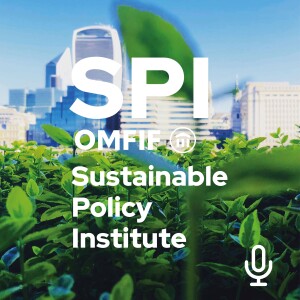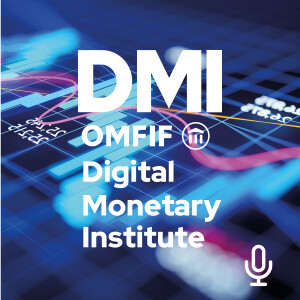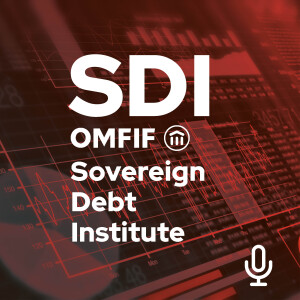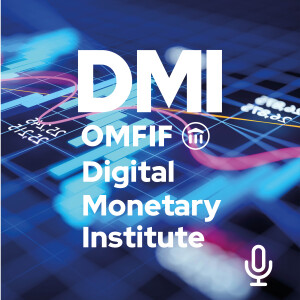
247.7K
Downloads
594
Episodes
Subscribe to the OMFIF podcast for the latest news and insight on financial markets, monetary policy and global investment themes. Published weekly, the podcast features input from a range of academic experts, central bankers and investment professionals. Visit our website at www.omfif.org.
Subscribe to the OMFIF podcast for the latest news and insight on financial markets, monetary policy and global investment themes. Published weekly, the podcast features input from a range of academic experts, central bankers and investment professionals. Visit our website at www.omfif.org.
Episodes

Tuesday Jul 11, 2023
Tuesday Jul 11, 2023
Catalysing energy efficiency and security, while scaling clean energy production and increasing decarbonisation has been high on policy-makers’ agendas. This podcast discusses how the United Nations is working to converge regulatory and policy frameworks to support this, the tools and classifications required and the latest criteria and technological developments. This conversation will also discuss how to scale growth and economic development, while responsibly using natural resources and scaling up of capital to support renewable energy.

Tuesday Jul 04, 2023
Artificial intelligence: promises and risks to the macroeconomy
Tuesday Jul 04, 2023
Tuesday Jul 04, 2023
How is artificial intelligence impacting economies, political environments, financial markets and misinformation? In this podcast, Julian Jacobs, senior economist, OMFIF, interviews Darrell West, senior fellow, the Brookings Institution, to discuss the promises and perils that may emerge as countries embrace AI. What are the policy challenges and how can governments work to counter them? This podcast will discuss the implications of AI on economic inequality, productivity growth, central banking, financial stability and misinformation amid the rise of large language models.
Darrell West is a senior fellow for Brookings' Center for Technology Innovation within the Governance Studies program and a co-editor-in-chief of TechTank. West is the former vice-president and director of Governance Studies. His current research focuses on artificial intelligence, robotics and the future of work. West is also director of the John Hazen White Manufacturing Initiative. Prior to joining Brookings, he was the John Hazen White Professor of Political Science and Public Policy and director of the Taubman Center for Public Policy at Brown University.

Thursday Jun 29, 2023
What can public finance management teach the green bond market?
Thursday Jun 29, 2023
Thursday Jun 29, 2023
Though generally treated as separate, the qualities of good management of public spending – transparency, efficiency, high quality impact assessment – have much in common with the qualities encouraged in sustainable finance. Editor of the Digital Monetary Institute Lewis McLellan is joined by Eila Kreivi, European Investment Bank’s chief sustainable finance adviser, Alex Caridia, RBC’s head of public sector markets, and Mark MacDonald, EY’s global lead for public finance management, to discuss the similarities between the two areas and how technological developments are impacting both.

Tuesday Jun 27, 2023
Gilts: rates uncertainty, recession fears and record supply
Tuesday Jun 27, 2023
Tuesday Jun 27, 2023
Brian Mangwiro, portfolio manager, global fixed income and currencies, Barings, speaks to Burhan Khadbai, head of content at OMFIF’s Sovereign Debt Institute, on the factors behind the surge in Gilt yields in weeks past.
Topics also include the buying opportunities in Gilts, the Bank of England’s response in tackling inflation, lessons learned from last autumn’s liability-driven investing crisis and more.
Recorded on 23/06/23

Friday Jun 23, 2023
GPI 2023: Reserve managers navigating losses, stagflation and geopolitics
Friday Jun 23, 2023
Friday Jun 23, 2023
Amid persistent inflation, heightened recession risks and prolonged geopolitical tensions, central bank reserve managers find themselves confronting yet another difficult year. This challenging macroenvironment is impacting their investment strategies and, for some, it is raising concerns about the adequacy of their reserves. Join Nikhil Sanghani, managing director of research, and Taylor Pearce, senior economist at OMFIF, as they discuss some of the key findings from the 10th Global Public Investor report: https://www.omfif.org/gpi2023/.

Thursday Jun 15, 2023
How to enforce the law on blockchain technology
Thursday Jun 15, 2023
Thursday Jun 15, 2023
Mike Kanovitz, chief executive officer of Jurat Blockchains, joins Lewis McLellan, editor of the Digital Monetary Institute, to discuss the challenges of making court orders enforceable on the blockchain. Traditional finance has intermediaries that can implement the decisions of courts, such as freezing assets and reversing transactions. But in a decentralised context, this is more challenging. Kanovitz explains the role of Jurat's technology in creating a means for the law to be enforced in decentralised circumstances.

Thursday Jun 01, 2023
Global Public Investor 2023: A preview
Thursday Jun 01, 2023
Thursday Jun 01, 2023
How are central bank reserve managers navigating a tumultuous global economy? Are they continuing to flee to safety? Or are they shifting toward or away from the dollar? Has their approach to Chinese assets changed on account of geopolitical conflict? And, amid such uncertainty, have central bank reserve managers been able to continue to develop their environmental, social and governance initiatives?
In this podcast, Taylor Pearce and Julian Jacobs, senior economists at OMFIF, present a preview of the 2023 Global Public Investor report: our flagship study of central bank reserve managers. The report offers an insight into central bank behaviour, decision-making and beliefs about the future.
The report will be launched on 27 June. Find out more here.

Friday May 26, 2023
The economic consequences of Türkiye’s run-off election
Friday May 26, 2023
Friday May 26, 2023
As the world's eyes turn towards Türkiye's pivotal run-off election on 28 May, the implications reach far beyond its democracy and regional standing. The nation's economy, weathered by skyrocketing inflation rates and a plunging currency value, stands at a critical juncture.
In this podcast, Erich Arispe Morales, senior director of sovereigns at Fitch Ratings, speaks with Taylor Pearce, senior economist at OMFIF. They delve into the intricate interplay between this Sunday's run-off election and the economic ramifications awaiting Türkiye.

Friday May 26, 2023
Reaching global consensus on digital asset regulation
Friday May 26, 2023
Friday May 26, 2023
Crypto businesses have been crying out for regulatory clarity for years. At last, regulators around the world are beginning to deliver. Andrew Whitworth, Ripple’s policy director for Europe, the Middle East and Africa, joined Lewis McLellan, editor of OMFIF’s Digital Monetary Institute, to discuss the approaches to the crypto market that regulators are taking, where consensus is emerging and the gaps that remain to be filled.

Thursday May 25, 2023
The next generation of financial infrastructure
Thursday May 25, 2023
Thursday May 25, 2023
The plumbing of financial markets could soon be overhauled. Distributed ledger technology offers a new way of settling financial transactions. Lewis McLellan, editor of OMFIF’s Digital Monetary Institute, is joined by three experts on the cutting edge of this technology’s application to capital markets: John O’Neill, global head of digital assets strategy at HSBC, Mathew McDermott, global head of digital assets at Goldman Sachs, and Bertrand de Mazières, director general finance at the European Investment Bank, the most prolific issuer of blockchain bonds. The panel discusses the remarkable progress that blockchain bond technology has made in recent years, as well as the challenges remaining in implementation.
